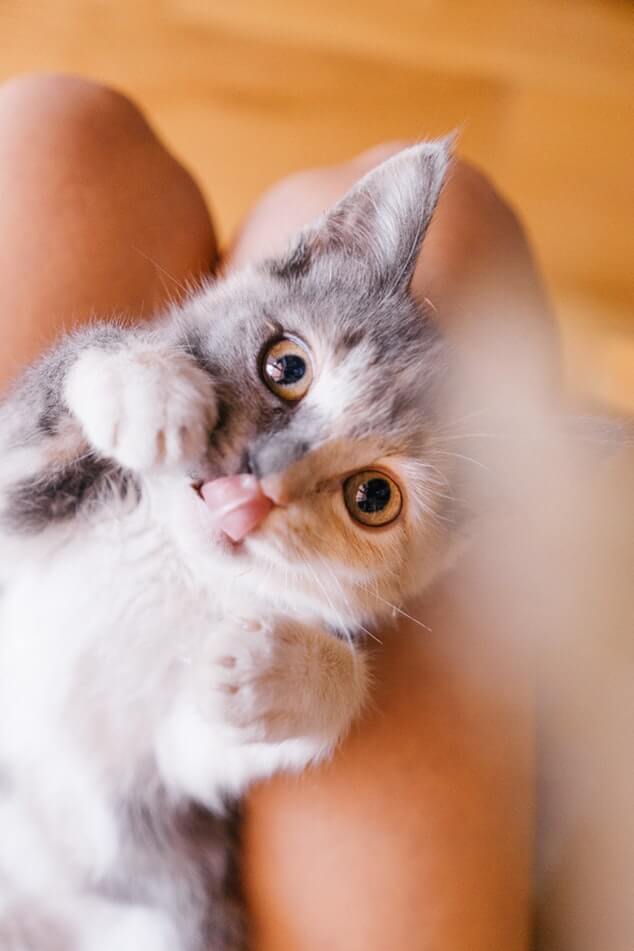
Humans have domesticated cats for more than 4,000 years ago, dating way back to the Egyptian time. Historically, cats are second only to dogs regarding human appreciation and friendship. Sharing your life with these feline pets is a rewarding experience, but you have to be ready for the commitment. One of the most interesting occurrences during cat encounters is dealing with when cats lick you.
To ultimately understand your cat’s licking behavior, it is essential to know how your cat interprets the world. First of all, every cat has a different personality defined by life experience or genetic make-up. While some continuously demand your attention, others are merely content with close proximity, and some are fearful of people. All of which is normal cat personalities. So if your cat doesn’t lick you, it’s not always a bad thing, or they aren’t unhappy.
But if your cat does indeed lick you, what does it mean? What is the history of this behavior? What could it indicate to the owner? There are several implications we can run through concerning this feline behavioral trait.
Table of Contents
Simple Boredom
Your cat can actually be idle and have no activity to keep them distracted. It’s been noted that kittens, in particular, need constant stimulation. A bored cat can entertain herself by scratching furniture or climbing curtains. So if it’s not doing that, it could lick you.
Curiosity Killed The Cat
Very curious by nature, cats will often lick and taste things for the sensory experience and education about their surroundings. So chances are that a sweet perfume or food spill on your skin can trigger the cut to lick you.
Love And Appreciation
One of the most straightforward reasons is love and appreciation. Many pet experts believe cat lick can lick their human owners as a clear showing of trust and care. You may as well interpret the licking as a sign of appreciation and safety the cat feels in your presence.
Marking Their Territory
In comparison to their wild counterparts like tigers, domesticated cats are still instinctive animals. They love their space and would do anything to protect it. So licking can be a sign of territorial marking for your feline pet.
Remember that territory is everything in the mind of cat especially when they are happy. Also, remember that cats have pheromones. So when they weave around your legs or ankles, they are showing love by depositing their unique scent and claiming you as their own.
Naughty Play
Cats are known to exhibit forms of affectionate play-fighting occasionally. So licking can be its way of being naughty to get interaction and play with you.
Similar to behavior recorded among wild cats with each other. This behavior may be seen in orphaned kittens.
Neediness and Attention
Your cat can lick you in a bid to get attention simply. Almost considered the neediest pets, licking could be a call signal for attention or that she misses you. Sometimes spending quality time with your cat may be the solution.
Anxiety and Stress
Yes, your cat does get stressed and anxious, and as a result, can lick you. Especially for kittens, it’s a condition called feline hyperesthesia.
We all react to stress differently as humans with some of us twirling our hair or biting nails. For your cat, it could involve a fixation that involves licking you.
The following are some tips to avoid stressors for your cat:
- Avoid territorial infringement by another cat or dog.
- Don’t suddenly disrupt their routine. Cats don’t deal well with surprises!
- Ensuring your cats gets adequate sleep of about 12- 16 hours average daily. Mainly during the day, since cats are nocturnal.
Is It Bad For Your Cat To Lick You? Is It Such A Bad Thing?
You’ll know how rough his tongue if she has leaked you continuously before. So it can be uncomfortable. Its tongue is covered by thousands of tiny “barbs” which allow the feline to groom itself. This could explain why we remarkably regard them as clean creatures since they do daily grooming of their own fur.
Aside from discomfort and stickiness or weird smell, experts do not recommend cat saliva and licking for more reasons. These reasons are health-related, and veterinary officers take them seriously.
Allergies
Contrary to popular belief, most pet allergy is caused by the protein in the pet’s saliva. Despite the cat fur misconception, cats produce multiple proteins with potential to cause allergies. However, cat allergen can still be found on cat skin and fur. Cat allergy is known to be common in people who have allergic asthma or hay fever.
Bacteria
When a cat licks itself and later licks you, it can transfer numerous parasites and bacteria present in its saliva. Pasteurella, Salmonella, E. coli, Clostridia and Campylobacter, are common bacteria that are present in the mouths of cats and can cause the intestinal disease to owners.
Besides, they can affect the human skin and lymph nodes. Luckily, unlike dogs, cats are not feces eaters, so parasite transmission to humans is limited.
Toxoplasma Infection
Cats acquire this by eating infected rodents, other small animals, or anything contaminated with feces from another infected cat.
With more than 60 million people in the U.S carrying the toxoplasma parasite, toxoplasmosis can cause severe illness in infants that contract it before birth or individuals with a lower immune system. Good news is; toxoplasmosis is treatable.
Risks of bacterial and parasitic infection from cats are most significant with very young children, the elderly, and immunosuppressed individuals.
How Can I Protect Myself From Any Health Risks Of Cat Saliva?
Make it a habit to change your cat litter boxes daily.
- Avoid adopting stray cats, especially kittens.
- Feed cooked, canned and dry commercial food to your cat. This reduces the chances of them getting bacteria and parasites.
- Never feed raw meat to your cats because it can be a source of bacteria and Toxoplasma infection.
- Always wash your hands after playing with your beloved feline.
- Limit your cat licking you.
How To Cope With It
Licking has some recorded benefits. Scientific researchers identified a chemical in cat saliva called histatins which are known to speed wound healing by promoting the spread and migration of new skin cells. Also, when saliva contacts the skin, it creates nitric oxide which inhibits bacterial growth and protects wounds from infection. So it’s not all bad!
It’s not easy to retrain a cat who is used to the habitual behavior of owner licking. Be patient and gentle, avoid yelling and physical reactions. It’s not impossible to rehabilitate a compulsive licker. At times, excessive licking can indicate negative behavioral change which you need to take notice of. It can be a vivid sign of distress or illness. In times like this, go to your vet immediately.
Conclusion
To effect behavioral change, distract it with toys or a gentle massage. You can also employ interactive play and make time for your cat. This can help reduce the effects of stress and erratic behavior.
Change is possible, as well-socialized cats will most likely have well-socialized kittens. Getting a cat to accept and follow a new behavioral routine and pattern will take time.
You May Also Interested In:
Share this:
- Click to share on Twitter (Opens in new window)
- Click to share on Facebook (Opens in new window)
- Click to share on Tumblr (Opens in new window)
- Click to share on Pinterest (Opens in new window)
- Click to share on Reddit (Opens in new window)
- Click to share on Telegram (Opens in new window)
- Click to share on WhatsApp (Opens in new window)
- Click to print (Opens in new window)
